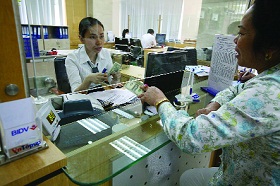Iron hand set to help control dollar credit
After requesting local lenders to submit outstanding dollar denominated loan reports, specific action is being taken to control possible risks.
 Scores of firms have taken advantage of cheap US dollar loans |
“Commercial banks must keep total outstanding loans in foreign currencies lower than their mobilisation levels and tighten controls over greenback credit lines and lending durations to prevent any payment risks,” said a State Bank statement.
The order to restrict dollar credit will ensure local lenders can recall foreign currency debts from corporate customers who took out loans to boost production and business for exports.
“Surprising surges in dollar credits had stuck ‘fragile labels’ on the stability of the foreign exchange market since the beginning of 2010. Thus, this tightening is needed,” said Duong Thu Huong, general secretary of the Vietnam Banking Association.
On June 11, the State Bank asked local credit institutions, which are allowed to provide forex services, to submit weekly reports on selling and lending foreign currencies. Domestic enterprises have still preferred dollar-denominated loans, whose interest rates are much lower than dong ones.
This caused the local banking system’s dollar credit growth to surge by 25 per cent compared to a slight 2.45 per cent rise in dong loans over the first five months of the year.
Local banking experts are worried that rising dollar loans could cause the forex rate to soar later this year when corporate borrowers tried to repay their debts. They also raised concerns over the possibility that local firms would take out dollar loans to import non-essential goods, putting more pressure on the country’s trade deficit, which had widened to $5.53 billion in the first five months.
At the moment, dong lending rates stand at around 13-14 per cent per year, while dollar lending rates are around 4-6 per cent, per year.
The State Bank still confirmed that the domestic forex market had been stabilised since late March, with a profuse supply of greenbacks. Earlier this month, the World Bank predicted that Vietnam would end 2010 with a $2.6 billion surplus in its balance of payments, versus its deficit of $8.8 billion in 2009.
Nguyen Dai Lai, vice head of Credit Information Centre, said that the large lending rate gap had encouraged corporate borrowers to borrow in dollars then sell these amounts for dong. “On the other hand, local banks, under profit pressures, might want to keep the pace in extending dollar loans. Additional inspections, thus, are needed,” Lai added.
What the stars mean:
★ Poor ★ ★ Promising ★★★ Good ★★★★ Very good ★★★★★ Exceptional
Related Contents
Latest News
More News
- Cashless payments hit 28 times GDP in 2025 (February 04, 2026 | 18:09)
- SSIAM and DBJ launch Japan Vietnam Capital Fund (February 04, 2026 | 15:57)
- Banks target stronger profits, credit growth in 2026 (February 04, 2026 | 15:43)
- Vietnam on path to investment-grade rating (February 03, 2026 | 13:07)
- Consumer finance sector posts sharp profit growth (February 03, 2026 | 13:05)
- Insurance market building the next chapter of protection (February 02, 2026 | 11:16)
- NAB Innovation Centre underscores Vietnam’s appeal for tech investment (January 30, 2026 | 11:16)
- Vietnam strengthens public debt management with World Bank and IMF (January 30, 2026 | 11:00)
- Corporate bond market poised for stronger growth cycle (January 28, 2026 | 17:13)
- Vietnam's IPO market on recovery trajectory (January 28, 2026 | 17:04)

 Tag:
Tag:




















 Mobile Version
Mobile Version